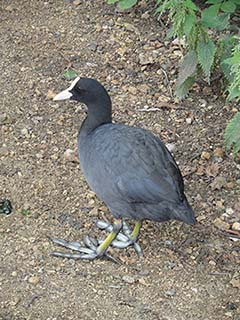Greece and Italy taken to EU Court of Justice over battery cages
In the years leading up to the full implementation of the ban on conventional battery cages in the European Union, I travelled to several countries around the world to discuss with governments, farmers, retailers and food companies the role that private standards and legislation can play in improving the conditions in which animals farmed for food production are kept.

Coot in Dulwich Park – London, UK, 2012
Particularly in Latin America, some farmers asked what would happen if some EU countries decided not to fully implement the ban, or to establish some derogations. At that point they received two conflicting messages: I explained that this would potentially trigger warnings issued by the European Commission, leading on to infringement procedures and eventually to fines for the country, which would be forced to implement the law; at the same time, some European farmers’ organisations and politicians – especially from southern Europe – were saying that they were preparing such derogations and that the ban would never take place.
I am glad to say that those farmers who thought they could boycott the 1999 Directive forever were wrong: the European Commission has just decided to take Greece and Italy to the Court of Justice of the European Union over their failure to correctly implement Directive 1999/74/EC banning “un-enriched cages” (battery cages).
In conventional cages, laying hens are kept in barren spaces where they are unable to perform most of their natural behaviours, including walking, perching, scratching or even turning around. They were developed after World War II, and their use rapidly spread around the world. Outrage over the conditions in which hundreds of millions of birds every year came to be kept also grew rapidly, and over the last 50 years many small and big campaigns to stop the use of this barbaric farming system have been organised in all continents. Gradually, some retailers started to respond positively to their customers’ requests, and stopped selling eggs produced by hens kept in cages. Some food companies did the same, and eventually some politicians decided to provide a legislative answer to this problem, starting with the ban on all cages that has been in place in Switzerland since 1991. In 1999 the EU decided on a phase-out of conventional battery cages by 2012.
The EU ban is not on all cages. While the barren conventional cages have been officially banned since 1 January 2012, ‘enriched cages’ are still allowed. In these, the hens have a little more space available (just over an A4 page each), collective perching spaces and scratching devices, and an area for dust-bathing.
A cage is a cage, and animal welfare is severely compromised in ‘enriched’ cages too, but even this very modest reform has not been implemented by some Greek and Italian farmers. This means that tens of millions of hens still spend their whole miserable life cycle in illegal conventional cages. Hence the infraction procedure started by the European Commission.
An increasing number of European retailers and food companies have already rejected the sale or use of all eggs produced by birds kept in cages, whether ‘conventional’ or ‘enriched’ and, thanks to mandatory labelling regarding the production method, EU consumers can choose to buy only eggs that come from hens kept in barns (without cages) or – better still – free-range, with regular outdoor access. According to the relevant EU Regulation, all organic eggs must be free-range too.
The procedure initiated against Greece and Italy by the EU Commission could result in fines paid by those States if they don’t act promptly to eliminate all remaining conventional cages. In other words, politicians may use taxpayers’ money to pay fines caused by their attempt to protect the interests of a few farmers who despise animal welfare – and the rule of law. In this case, hens, law-abiding farmers and citizens are all being penalised by a chain of dishonesty that the EU is now trying to break.
Cage systems for egg production should never have been adopted, but now it is definitely time for all cages to go. Hopefully, other countries and egg producers’ organisations around the world will soon follow in phasing out such an immoral farming system. It will be good for the animals, for consumers and for business. At least for businesses which want to respond to their consumers’ demands, rather than impose something that those consumers despise whenever they receive accurate and complete information.
You can see the European Commission’s announcement of its decision to take Greece and Italy to the EU Court of Justice on the European Commission’s website.

